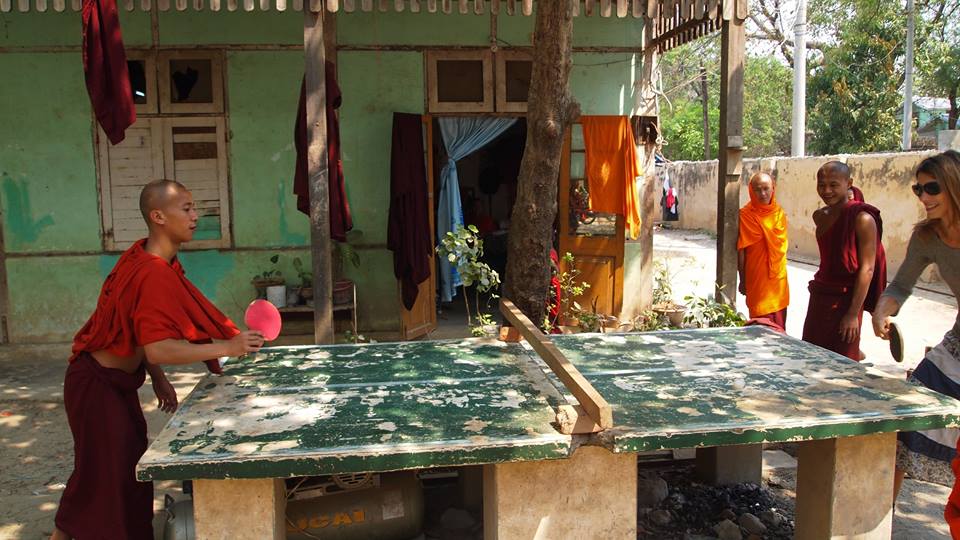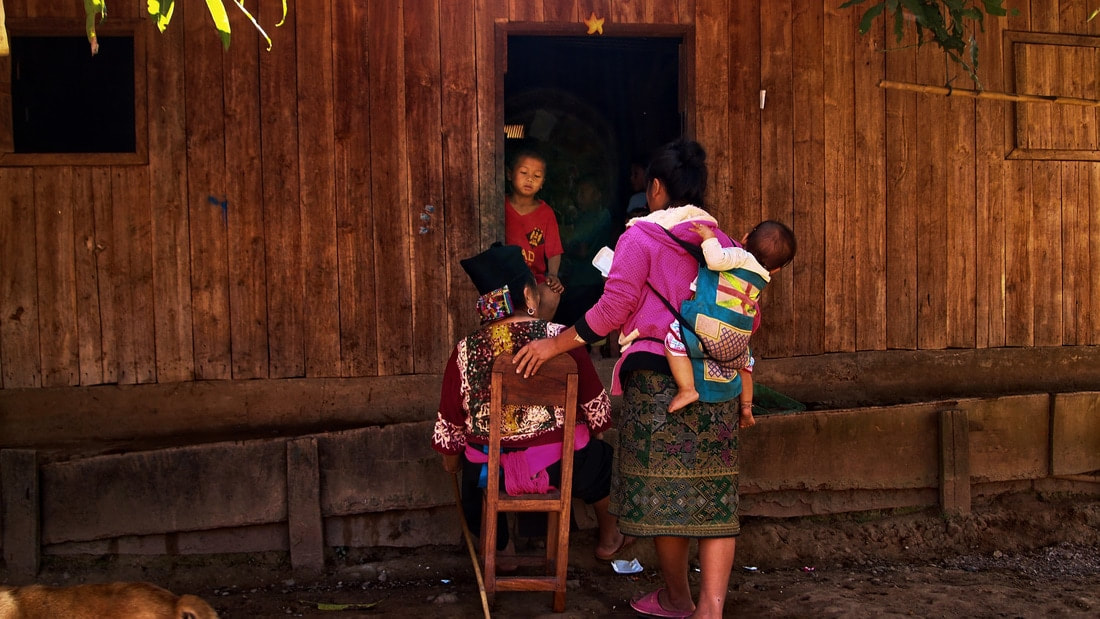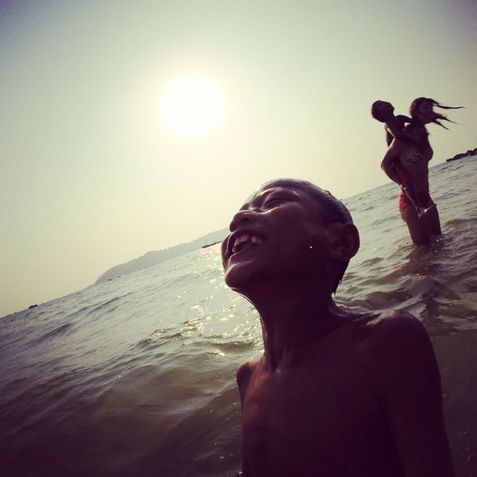|
Ping pong and Katy Perry in Mandalay, Myanmar. What could be better?
You know some of my favorite places to visit? The ones where, when people hear you speaking English, they don't rush over to sell you something -- they rush over to ask you if you're from California, if you've ever met George Bush, or if you own guns. I love visiting places where fathers ask you to come to their house for dinner to practice speaking English with their children. I love places where young monks invite you to visit their monastery to play ping pong and cook. One great rule of travel is to say yes, though I do have my limits. When I happened upon a wedding party while visiting a Lao hill tribe and the village elders invited me to sit with them and drink a bowl of blood, I politely declined -- then, disturbed, walked smack into a hanging meat carcass. But, generally, saying yes leads to the most authentic and memorable adventures. What would you rather do: visit (yet another) temple, or get a free, personal tour of a Myanma school, where you interact with students who are eager to practice speaking English with you? Obviously the latter. But here's the thing: As important and meaningful as it is to ask these children about their dreams and experiences... they also want to hear about yours. And you should tell them! They're not animals in a zoo. They're not there to be gawked at. They're people -- people who are genuinely curious about you. Is your thing cultural absorption, or is it cultural exchange? As I wrote in Sorry, But No. Not Every Part of Every Culture Deserves My Respect: I believe in cultural exchange. One piece of advice that changed my life was to follow the 80-20 rule. Consume 80% of the time, create 20% of the time. That's why I started this blog! But I've realized that travel should also follow the 80-20 rule. You absorb, participate, listen and learn 80% of the time... But in order for this to be a true cultural exchange, you need to give back 20% of the time. Whether delighting children in Laos with tales of lobster diving in California, teaching my surf buddies in Malaysia how to swing dance, or explaining the American electoral college system to a Swedish expat, I think it's meaningful to share, and not just take. Give knowledge. Give a story, a lesson, an experience. Show and tell what it's like to be you -- because, otherwise, you're just being selfish. *** There are those who think that this mentality is somehow "disrespectful" or "rude." Which I think is extremely condescending. Do you think you know better than these locals what conversations and cultural influences they "should" be allowed to participate in? And do you really think that, even if we don't interact directly, I should conform to certain standards of dress or behavior, just because it's "respectful"? To use another example from Sorry, But No. Not Every Part of Every Culture Deserves My Respect, the surfer bros at Elsewhere Surf Camp (I meant to go for one week, but I stayed for two!) told me that I should "cover up" while walking to the beach -- a three-minute walk down the road. And I'm like, no. I don't believe that all Sri Lankan men are sexual predators. I don't think it's reasonable to ask me to leave my belongings on the beach, where they will almost certainly be stolen, when I surf. And I don't think it's going to be the end of the world if Sri Lankans see me in bikini bottoms. And, really, is it so horrible for women, men, and children to see a confident, independent Western woman walking alone down the street with a surfboard and a bikini? Would it be better if they just had no idea what it was like in another part of the world -- or if their only representations of Western women came from porn and Bollywood? I don't travel so I can be the passive recipient of another culture. I travel to experience truly meaningful exchange, in which both parties have the opportunity to gain perspective, learn, and grow. Because, once again: locals aren't zoo animals to be gawked at. They're human beings to be interacted with. And when you see them that way, magic happens. For example, here are some awesome kids I met in Ngpali, Myanmar. I met them when I was coming out of the water after a low-tide free-diving session. A young Burmese boy with a gap-toothed grin ran my way, gesticulating between my gear and Sea of Bengal. I wasn't wild about letting a stranger put my snorkel in his mouth… but that smile is irresistible. He placed my mask over his face, and it immediately dropped onto his shoulders. I knelt to tighten the strap. Once it was snug, he dove through the small set of waves (well, small to me -- but I’ve got three feet on him!) and into the sea. Every few minutes, he lifted his head and shouted words I only understand from the accompanying charades. A crab! A big fish! Another big fish! A turtle! I’ve never seen anyone this excited about anything, I thought to myself. And I’m pretty sure that, given the right support, this child could be a genius at marine biology. Or a world expert on climate change. “Given the right support” being the key phrase. Obviously, I can't provide that. But maybe I can play some tiny part in helping a child whose beaches look like this (just 100 meters down from where the tourists stay): love the ocean and explore the underwater world -- perhaps for the first time. (I've found that lots of kids in developing countries have often never seen what's under the water.) I needed a new freediving mask, anyway. (That said, I never, ever give money to child beggars. And I never, ever buy anything from them It's one of the worst things you can do while traveling. I mean, we've all seen Slumdog Millionaire, right?) So, go! Immerse yourself in another culture. Visit the homes where families hand-roll thousands of cigarettes per day and build entire bamboo walls in just minutes! It's incredibly cool, especially when you have a guide or translator who can explain some of the nuances to you. But make sure you're leaving something positive behind, too. Because 80-20. Amirite? *** Want to check out an audio version of this post? You'll find it on Youtube!
0 Comments
Leave a Reply. |
About the Author

Eva is a content specialist with a passion for play, travel... and a little bit of girl power. Read more >
Want to support The Happy Talent? CLICK HERE!
Or Find me on Patreon!
What's Popular on The Happy Talent:
Trending in Dating and Relationships:
What's Popular in Science: Playfulness and Leisure Skills:
Popular in Psychology and Social Skills:
Categories
All
|






























 RSS Feed
RSS Feed